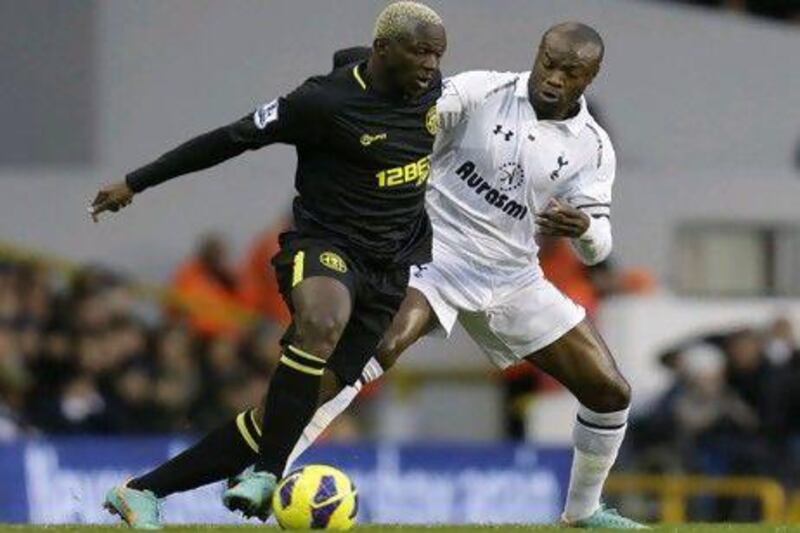Arouna Kone felt for some years he would like an English chapter in his much-travelled career.
The Ivorian striker, who turns 29 this weekend, has collated a variety of experiences.
English football had been missing from a full list that contains a range of leagues – from the second division in his native Ivory Coast, to the Belgian, Dutch, Spanish and German top-flights – plus a World Cup, an African Cup of Nations final, sudden turns of fortune, a fortune spent on him, and some bizarre instructions.
The most bizarre? Perhaps the time when the club he was starring for said it was not in their economic interests for him to score any more goals for them.
That was at Levante in Spain, where Kone resurrected his career last season, the campaign that would prove his springboard to the English Premier League.
It is natural for a member of Ivory Coast's so-called golden generation to find English football attractive. The Premier League evidently suits Kone's style of football, too. Since signing for Wigan Athletic at the end of the transfer window, his nine starts have yielded three goals and an assist.
Whether his forceful, goal-line challenge on the Tottenham Hotspur goalkeeper Brad Friedel in the lead up to Ben Watson's only goal of the game at White Hart Lane last Saturday counts as an extra assist is open to debate.
Referees elsewhere in the world might have called it a foul. A muscular striker like Kone is bound to appreciate the Premier League's tolerance of physical combat.
But Kone is about far more than simply strength in duels. He is quick and crafty, a centre-forward with an astute sixth sense of the movement of colleagues. He plays the lone striker role cleverly, excellent with his back to goal and holding the ball up.At Wigan he is already praised as a teammate, specifically by Franco Di Santo, whose own good form has earned the Argentine a first international call-up.
Kone also returned to his national squad recently, after a long absence caused partly by serious injury, slumping form and the tough competition for places that has affected most of the strikers from probably the finest generation of Ivorian footballers in history.
As a teenager, Kone impressed at the 2003 World Under 20 Cup in Mexico. By then, he was already under contract at Lierse in Belgium, having been spotted playing second-tier club football in Abidjan. From Lierse he moved to Holland, scored goals freely at Roda, then joined PSV Eindhoven.
It was on relocating to Spain that Kone suffered setbacks. Sevilla made him the most expensive signing in their history in 2007. But the coach who had pushed for his recruitment, Juande Ramos, left within two months of his arrival and he struggled to keep a place in a forward line built around the elegant Freddie Kanoute and the Brazilian Luis Fabiano.
Frustration got to him. His finishing became impatient; he had a scuffle with a member of the coaching staff. Just as he was about to start his second campaign with Sevilla, he suffered a serious knee injury.
His comeback trail would be slow, but gathered a momentum during a loan stint at Hannover. In the summer of 2011, Sevilla agreed to let Levante, newly promoted to Spain's Primera Liga, borrow Kone with a clause stating that, once there, if he scored fewer than 18 goals they could then keep him.
At Levante, the confident Kone of his Dutch league days reappeared, and rapidly. Levante's underdog march to the upper rungs of the Spanish table would be propelled by his goals. By the last weekend of April, with Levante pushing for a possible Champions League place, he had scored 17.
So his new club had a dilemma. An 18th goal would have meant Kone returning to Sevilla's ownership.
Levante did not field their totemic striker again. That enabled them to keep him, contract him and almost immediately earn a transfer fee – they had huge debts to settle – from his sale.
Sometimes the business of football throws up these counter-intuitive scenarios. But when Wigan offered close to €5 million (Dh23.4m) for the player, Levante were happy to give Kone his wish, a crack at the Premier League.
Follow us
[ @SprtNationalUAE ]






